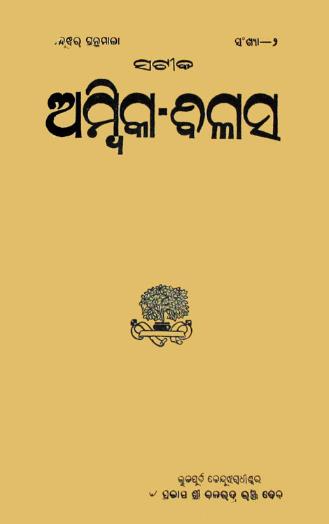In the evolving world of Odia literature, the year 1937 stands out as a significant milestone with the publication of Ambika Bilasa by the celebrated poet Balabhadra Bhanjadeb. This collection of poetry is cherished not only for its lyrical beauty but also for its profound exploration of themes such as love, nature, and spirituality. It provides readers with a glimpse into the intimate relationship between the individual and the universe, all through the lens of Bhanjadeb’s delicate yet powerful verse.
The title Ambika Bilasa refers to the essence of devotion and celebration associated with the goddess Ambika, who symbolizes fertility, strength, and the nurturing aspects of feminine energy. Bhanjadeb’s poetry captures this essence, intertwining the divine with the everyday experiences of love and longing. Through his evocative imagery, the poet invites readers to partake in a journey that transcends the mundane, elevating their experiences to a spiritual and existential level.
One of the hallmarks of Ambika Bilasa is its rich descriptive language. Bhanjadeb excels in painting vivid images of nature, using the natural world as both a backdrop and a character in his poetry. His verses invoke lush landscapes, blooming flowers, and the sounds of the environment, all of which create an immersive experience for the reader. Nature is not just a setting but a participant in the emotional landscape of the poems, reflecting the inner turmoil and joys of love.
The exploration of love in Ambika Bilasa is multifaceted. Bhanjadeb’s poetry expresses romantic love, familial bonds, and the deep connection one shares with the divine. The poet’s ability to articulate the complexities of love—its joys, sorrows, and exaltations—resonates deeply with readers. He captures the nuances of affection and devotion, making the emotions accessible and relatable. This exploration often transcends worldly love, inviting reflections on a higher, spiritual love that connects the individual to the divine and to the universe.
Moreover, Ambika Bilasa is significant for its philosophical undertones. The poet often ponders the nature of existence, the transience of life, and the eternal pursuit of meaning. His reflections invite readers to engage with their own lives, encouraging a deeper understanding of their place in the world. The interplay of love and nature serves as a profound commentary on the human experience—how we are shaped by our emotions and how these emotions connect us to the larger cosmos.
Balabhadra Bhanjadeb’s Ambika Bilasa also plays a vital role in the cultural identity of Odisha. Published during a period of socio-political transformation, this work contributes to the preservation and promotion of the Odia language and literature. The poems reflect the rich cultural heritage of Odisha, showcasing regional customs, traditions, and the beauty of the local environment. This connection to cultural roots enriches the reading experience, making it a celebration of both personal and collective identity.
As we revisit Ambika Bilasa, we recognize its enduring relevance. The timeless themes of love, nature, and spiritual exploration resonate with contemporary readers just as powerfully today as they did nearly a century ago. In a world marked by rapid change and uncertainty, Bhanjadeb’s poetry offers solace, beauty, and a reminder of the profound connections that exist within ourselves and with the world around us.
Books Info
| Books name | Ambika Bilasa / ଅମ୍ବିକା ବିଳାସ |
| Author | Balabhadra Bhanjadeb |
| No Of pages | 311 |
| Publisher | Sri Balakrushna Kara |
| Publication | 1937 |
| Printed At | Saraswata Press |
| Distributor | NA |

